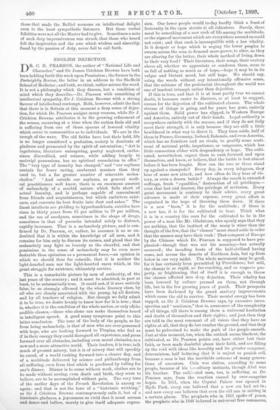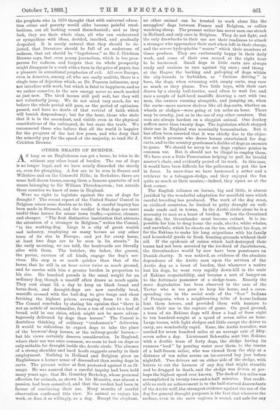ENGLISH DEJECTION. D R. C. H. PEARSON, the author of "National
Life and Character," and Sir James Crichton Browne have both been holding forth this week upon Pessimism ; the former in the Fortnightly Review, the latter in an address to the Sheffield School of Medicine ; and both, we think, rather misuse the word. It is not a philosophy which they discuss, but a condition of mind which they describe,—Dr. Pearson with something of intellectual sympathy, Sir J. Crichton Browne with a strong flavour of intellectual contempt. Both, however, admit the fact that there is in Britain at this moment a deep sense of dejec- tion, for which Dr. Pearson assigns many reasons, while Sir J. Crichton Browne attributes it to the growing refinement of the senses, occurring at a time when the nation feels old and is suffering from one of those spasms of lowered vitality which occur to communities as to individuals. We are in the trough of the wave. The old faiths have lost their hold, life is no longer considered a probation, society is destitute of gladness and permeated by the spirit of ostentation ; " Art is lugubrious, literature uninspiring, poetry neglected, enthu- siasm discredited, and science, while adding largely to material possessions, has no spiritual consolation to offer." The "very type of insanity has changed," and "our asylums contain far fewer raving, exuberant maniacs than they used to, but a far greater number of miserable melan- °holies." "And outside our asylums, as general medi- cal practitioners well know, there is an enormous amount of melancholy of a, morbid nature which falls short of actual insanity, and is perhaps capable of concealment from friends and acquaintances, but which embitters exist- ence, and converts its best fruits into dust and ashes." The finest intellects are yielding to hypochondriasis, suicides have risen in thirty years from 65 per million to 79 per million, and the use of anodynes, sometimes in the shape of drugs, sometimes in that of pursuits intended solely to distract, rapidly increases. That is a melancholy picture, and is con- firmed by Dr. Pearson, or, rather, he assumes it as so un- doubted that it is within the knowledge of all men, and it remains for him only to discuss its causes, and plead that the melancholy may fight as bravely as the cheerful, and that pessimism in the sense of melancholy may be even more desirable than optimism as a permanent force,—an opinion in which we should thus far coincide, that it is neither the light-hearted man nor the light-hearted races which, in the great struggle for existence, ultimately survive.
This is a remarkable picture by men of authority, of the last years of the century ; and it must be admitted, in part at least, to be substantially true. It could not, if it were entirely false, be so strongly affirmed by the whole literary class, by all who are closely associated with the young, by all doctors, and by all teachers of religion. But though we fully admit it to be true, we desire keenly to know how far it is true ; that is, whether it is the condition of the whole nation, or only ofjthe audible classes,—those who alone can make themselves heard in intelligent speech. A good many symptoms point to this latter conclusion. The tone of the body of the people, so far from being melancholy, is that of men who are over-possessed with hope, who are looking forward to Utopias, who feel as if in their energy they could disregard all experience, and press forward over all obstacles, including even moral obstacles, to a new and a more attractive world. Their leaders, it is true, talk much of present misery, but it is of misery that will speedily be cured, of a world rushing forward into a clearer day, and of a multitude delivered by science and philanthropy from all suffering, even from that which is produced by toiling for one's dinner. Dinner is to come without work, clothes are to be made without sewing, even death and birth, they seem to believe, are to be accomplished without pain. The very tone of the earlier days of the French Revolution is among us again ; and that is not the tone of a, "histrionic writhing," as Sir J. Crichton Browne contemptuously calls it, but of a, histrionic gladness, a joyousness so vivid that it must scream and dance and bellow, merely to give itself adequate expres- sion. Our lower people would to-day hardly think a feast of fraternity in the open streets at all ridiculous. Surely, there must be something of a new rush of life among the multitude, or the signs of movement which are everywhere around us could not exist; and that rush is incompatible with a low vitality. Is it despair or hope which is urging the lower peoples to swarm across the seas, to demand more power, to alter, as they are altering for the better, their whole method of living, down. to their very food P Their literature, their songs, their oratory above all, whether we appreciate or condemn them, seem to us full of nothing so much as of hope,—hope it may be in its vulgar and blatant mood, but still hope. We should say, using the words without any intentionally offensive sense, that the subtone of the proletariat throughout the world was one of insolent triumph rather than dejection.
If this is true, and that it is at least partly true we cannot doubt, it becomes easier to discover, or at least to suggest, causes for the dejection of the cultivated classes. The whole stream of things is going, and for years has gone, entirely against them. Solid power has slipped, in Western Europe and America, entirely out of their hands. Legal authority is everywhere entirely with the masses, and if they do not fully exert their strength, it is only because they are still a little bewildered in what way to direct it. They turn aside, half of them in France, Germany, Ireland, Bohemia, and even America, which has no frontiers and no rivals, to gratify some senti- ment of national pride, impatience, or vengeance, which has little connection either with despondency or hope. The culti- vated, nevertheless, expect them to rush forward and upon themselves, and know, or believe, that the battle is lost almost before it has been fought. How can the two or three stand up against a stampede P Every day, in every telegram, they hear of some new attack, and how often do they hear of vic- tory, or even a drawn battle ? Always the result is extended suffrage, fresh " equalities," destruction of all privileges,— even that last and dearest, the privilege of seclusion. Every great movement is contrary to their advice, every great advance is made at their expense, every great effort is organised in the hope of throwing them down. If there is a new "boon," it is for the multitude ; if there is a new tax, it is for the cultivated to bear. Think what it is in a country like ours for the cultivated to be in the power of a man like Mr. Gladstone, who openly says that they are nothing, that the instinct of the many is wiser than the thought of the few, that the " classes" must stand aside in order that the masses may have their rush ! That conquest of Europe by the Chinese which Dr. Pearson is supposed to have pro- phesied—though that was not his meaning—has actually occurred ; the invading hosts of the half-civilised having come, not across the deserts of Northern Asia, but up from below in our very midst. The whole movement may be good, for it has certainly been permitted by Providence ; but still, the change is so rapid, so far-reaching, and as respects pro- perty, so frightening, that of itself it is enough to throw the classes affected into deep dejection. Their vitality has been lowered by culture pressed on them, not through life, but in the few growing years of youth. Their prospects have been darkened by the grand sanitary improvements which cause the old to survive. Their mental energy has been sapped, as Sir J. Crichton Browne says, by excessive intro- spection and " sentience," that is, awareness of the complexity of all things, till there is among them a universal hesitation and doubt of themselves and their rights ; and just, then they are told in the most resonant of all voices that they have no rights at all, that they do but cumber the ground, and that they must be pulverised to make the path of the people smooth. Just at this moment, too, when the outlook seems blackest, the cultivated, as Dr. Pearson points out, have either lost their faith, or been made doubtful about their faith, and are filling up the void with ideas like heredity and its greater congener, determinism, half believing that it is unjust to punish evil, because a man is but the inevitable outcome of many genera- tions of ancestors. Cain was sinless, according to some people, because of his he' editary instincts, though Abel was his brother. The cultivated man, too, is suffering, as Dr. Pearson says, from the reaction caused by over-sanguine hopes. In 1851, when the Crystal Palace was opened in Hyde Park, every one believed that a new era had set in; and now every one believes that even the old one is setting in a certain gloom. The prophets who in 1851 spoke of peace, the prophets who in 1846 believed in universal free commerce, the prophets who in 1870 thought that with universal educa- tion crime and poverty would alike become painful recol- lections, are all looking round disenchanted ; and as they look, they see their whole class, all who can understand or sympathise with ideas, derided, insulted, and gradually despoiled. It is surely natural that they should be de- jected, that literature should be full of an undertone of sadness, that art should be "lugubrious," as Sir J. Crichton Browne says, that even penny journalism, which is too pros- perous for sadness, and forgets that its whole prosperity might disappear in a week with a turn in the price of paper, has a pleasure in sensational prophecies of evil. All over Europe, even in America, among all who are easily audible, there is a single tone of dejection which, as Dr. Pearson intimates, may mot interfere with work, but which is fatal to happiness, and as we rather conceive, to the new energy never so much needed as just now. The tired horses still pull well, but they will not voluntarily jump. We do not mind very much, for we believe the whole period will pass, as the period of optimism passed, and have no doubt of that revival of faith which will banish despondency; but for the hour, those who state that it is in the ascendant, and visible even in the physical constitutions of the cultivated, do but state the truth. We recommend those who believe that all the world is happier for the progress of the last few years, and who deny that the minority pay for the speed of the majority, to read Sir J. Crichton Browne.







































 Previous page
Previous page